Suchergebnisse für "Factsheet: Energietechnologien gestalten, die für alle sinnvoll und nutzbar sind"
Nachhaltiges Investment - Rendite mit gutem Gewissen
7. - 8. April 2010
Raiffeisenakademie
Steingasse 11-13
1030 Wien, AT
Diese Schulung wird im Rahmen der Programmlinie "Fabrik der Zukunft" - einer Initiative des BMVIT - durchgeführt.
LTS-Flywheel als 12h-Energiespeicher
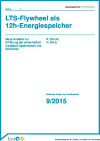
Neue Ansätze zur Erhöhung der wirtschaftlich nutzbaren Speicherzeit und Sicherheit
Schriftenreihe
9/2015
A. Schulz, H. Sima
Herausgeber: BMVIT
Deutsch, 139 Seiten
Downloads zur Publikation
IEA Wind Annual Report 2014
Der IEA Wind Jahresbericht 2015 ist veröffentlicht und online verfügbar!
Energybase - Das Bürohaus der Zukunft
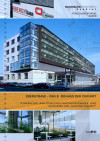
Planung und Umsetzung eines Demonstrationsgebäudesim Rahmen von "Haus der Zukunft"
3/2010
Herausgeber: BMVIT
Deutsch, 6 Seiten
Downloads zur Publikation
Ausstellung: Baufamilien-Tag
29. Mar 2009
1. Europäisches Passivhausdorf zum Probewohnen
Großschönau, AT
Der Sonnenplatz Großschönau veranstaltet am 29. März 2009 einen Baufamilien Tag. Dieses Mal zum Schwerpunktthema "Keller im Passivhaus".
Haus der Zukunft Plus - 3. Ausschreibung
Bis zum 12.10.2011 können noch Projektanträge im Rahmen der 3. Ausschreibung des Forschungs- und Technologieprogramms "Haus der Zukunft Plus" in den beiden Themenschwerpunkten "Industrielle Umsetzung innovativer Technologien" und "Demonstrationsbauten" eingereicht werden.
15. Internationale Passivhaustagung (27./28.5.2011, Innsbruck)
Claudia Dankl (ÖGUT) und Isabella Zwerger (BMVIT) präsentierten bei der 15. Internationalen Passivhaustagung im Rahmen des Vortrags "Haus der Zukunft Plus - ein österreichisches Forschungs- und Technologieprogramm" aktuelle Ergebnisse aus dem Programm.
Demonstrationsgebäude aus Haus der Zukunft
Eine Österreichkarte bietet Überblick über innovative Neubau- und Sanierungs-Projekte
Produzieren mit Sonnenenergie
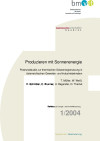
Potenzialstudie zur thermischen Solarenergienutzung in österreichischen Gewerbe- und Industriebetrieben
Schriftenreihe
01/2004
T. Müller, W. Weiß, H. Schnitzer, C. Brunner, U. Begander, O. Themel
Deutsch, 305 Seiten
Downloads zur Publikation
Film DVD S-HOUSE - Schiestlhaus - Lust auf Lehm

Dokumentation zweier einzigartiger Gebäude und Fernsehdoku über den Baustoff Lehm
Deutsch
"ecofashion - Mode mit Zukunft!"
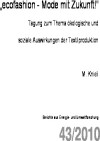
Tagung zum Thema ökologische und soziale Auswirkungen der Textilproduktion.
Schriftenreihe
43/2010
M. Knieli
Herausgeber: BMVIT
Deutsch, 258 Seiten
Downloads zur Publikation
Ausstellung: Baufamilien-Tag
29. August 2010
1. Europäisches Passivhausdorf zum Probewohnen
3922, Großschönau, AT
Der Sonnenplatz Großschönau veranstaltet am 29. August 2010 einen Baufamilien-Tag. Dieses Mal zum Schwerpunktthema "Wärmepumpe".
Task 38 Roundtable (25.11.2010, 31.1.2011 & 8.4.2011)
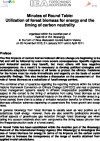
Energetische Nutzung der forstlichen Biomasse und zeitliche Betrachtung der Kohlenstoffneutralität
Herausgeber: BMVIT
Downloads zur Publikation
Shutdown factory - Central control and communication system and overall concept for a reduction of energy cost and optimization of resources during the stand-by-mode of industry facilities
Development of solutions to reduce the energy cost during the stand-by-mode of industry facilities. Focus areas: innovative control and communication system for the problem of the shut down and start up, entire concept on energy savings cost during the stand-by-mode, creating awareness concerning the problem in the industry
Info-Veranstaltung: Baufamilien-Tag
31. Mai 2009
1. Europäisches Passivhausdorf zum Probewohnen
3922, Großschönau, AT
Der Sonnenplatz Großschönau veranstaltet am 31. Mai 2009 einen Baufamilien Tag. Dieses Mal zum Schwerpunktthema "Sanierung mit Passivhauskomponenten".
Dampf-Schraubenmotor-BHKW (Hartberg/A)
In Hartberg wurde ein bestehendes Biomasse-Fernheizwerk mit einem Dampf-Schraubenmotor zu einer KWK-Anlage erweitert.
Symposium: Gesundes Sanieren - vom globalen Anspruch zur bautechnischen Praxis
10. - 11. November 2011
Bildungshaus Schloss Puchberg4600 Wels, AT
Vorträge, Praxisbeispiele, Erfahrungsaustausch
SUMMIT, Sustainable Management Methods Integrating Tool-Kit plus Prepare Plus
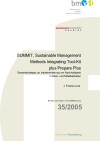
Gesamtstrategie zur Implementierung von Nachhaltigkeit in Klein- und Mittelbetrieben
Schriftenreihe
35/2005
J.Fresner
Deutsch, 174 Seiten
Downloads zur Publikation
IEA SHC Task 61, EBC Annex 77: Working to Meet the Needs of the Lighting Industry (2019)

Kurzbericht zum 3. Industrieworkshop des Tasks in Peking, China in der Ausgabe des IEA SHC SOLAR UPDATE, dem aktuellen Newsletter des IEA SHC Programms.
Jan de Boer (Operating Agent), Editor: Pamela Murphy
Herausgeber: SOLAR UPDATE
Englisch, 25 Seiten
Downloads zur Publikation
Info-Veranstaltung: "Grund-Strohballen-Legung" S-House
26. Mar 2003
BÖZAT - Böheimkirchen Zentrum für Angepasste Technologie, 3071 Böheimkirchen, Obere Hauptstraße 2Böheimkirchen, AT
Veranstaltung zur Programmlinie "Haus der Zukunft"
